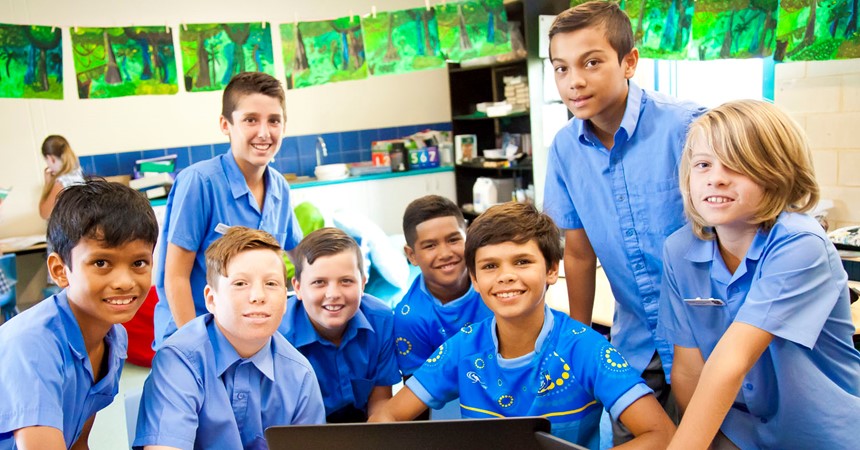Over 1000 Aboriginal and Torres Strait Islander students are enrolled from Kindergarten to Year 12 in Catholic schools in the Diocese of Maitland-Newcastle.
Every year, we have opportunities to celebrate significant Aboriginal events to share and inform everyone about Aboriginal and Torres Strait Islander culture and identity. Reconciliation Week and NAIDOC in particular, help schools to understand the First Australians in a school community planned activity or liturgy.
Celebrations of the richness and diversity of culture and creativity often encompass a variety of contemporary and traditional forms including dance, music, theatre, arts and crafts and bush tucker which are the highlights of the school calendar.
Culturally, these opportunities offer a unique snapshot of traditional local identity, both providing an opportunity to revitalise and preserve cultural practices, and often serving as a creative opportunity for contemporary performers.
Socially, they are a means of strengthening cultural dialogue and promoting deeper understanding through shared experiences. This experience has led students and teachers to a lunch time sharing of Aboriginal and Torres Strait Islander bush food tastings.
We encourage all students and schools to celebrate who they are and take part in numerous cultural events throughout the year.
Schools can make a big difference by creating a working partnership with Aboriginal and Torres Strait Islander families, to assist parental engagement on student learning outcomes and building social and human relationships of trust and mutual support.
What can schools do?
Tip 1: A culturally inclusive school
Connecting with Aboriginal and Torres Strait Islander families to support parental engagement is easier where those strategies are not a one-off event, but part of a wider, structured and holistic approach to culturally respectful practice in the school.
- Reduce power imbalances in practical and visible ways – have the school principal available at school drop off and pick up times, and be prepared to meet Aboriginal and Torres Strait Islander families at a more neutral or familiar location (such as a local Indigenous organisation).
Tip 2: A partnership approach
A philosophy of ‘doing with’ rather than ‘doing at’ creates a school where Aboriginal and Torres Strait Islander families see themselves as active participants, working in partnership with teachers to share their culture and support their child’s learning.
- Create a warm and welcoming environment with parent-friendly spaces that encourage interaction between the school and parents, and among all parents.
- Actively create a range of opportunities for Aboriginal and Torres Strait Islander families to share their stories, cultural perspectives, food and customs.
Tip 3: Reach out and get involved
The school is a community focal point. Having strong, open two-way relationships with local Aboriginal and Torres Strait Islander community groups and organisations reduces misunderstanding and fear, and emphasises that teachers and parents both have important, though different, roles to play.
- Encourage school participation in local Aboriginal and Torres Strait Islander community events.
- Acknowledge the importance of encouraging relationships with Aboriginal and Torres Strait Islander community leaders and other support networks, to assist in the process of promoting two-way communication and engagement with Indigenous families in the school community.
For further information, click on the links below.
